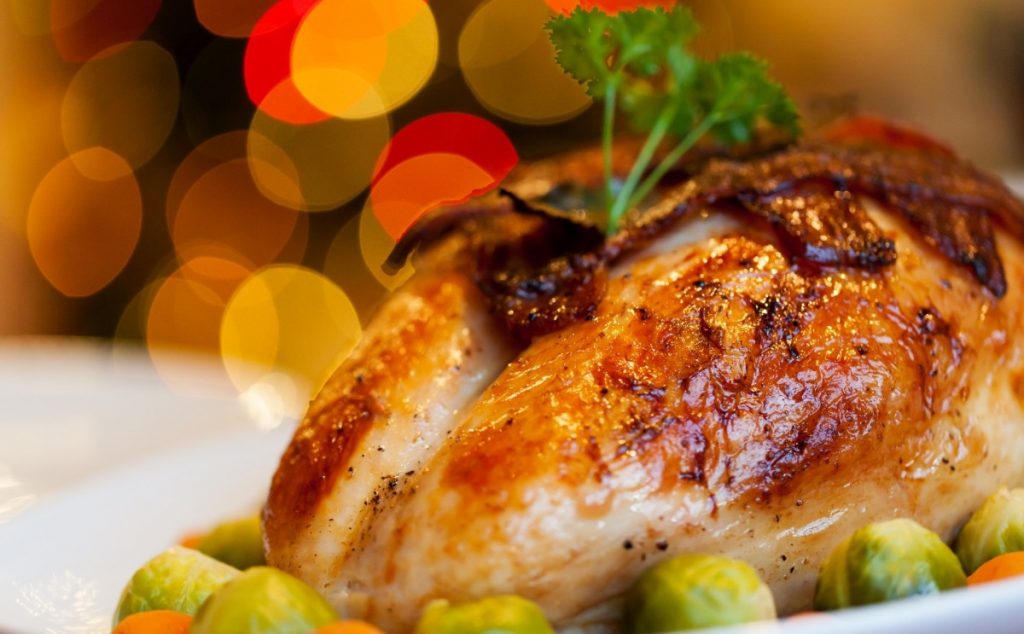
By Andy Brack, editor and publisher | The first Thanksgiving in South Carolina probably was in French. Or Spanish.
More than 100 years before the English settled in Charleston in 1670, the French built a small wooden fort on what is now Parris Island. Known as Charlesfort in honor of the French king, it was abandoned after a couple of years.
 Then in 1566, the Spanish established Santa Elena in the same area as the northernmost settlement of its province of La Florida. For much of its first 10 years, Santa Elena was the capital of La Florida.
Then in 1566, the Spanish established Santa Elena in the same area as the northernmost settlement of its province of La Florida. For much of its first 10 years, Santa Elena was the capital of La Florida.
Both footholds in what is now South Carolina shared two things: the lack of a steady supply of food and tough living conditions. But French and Spanish cultures, like those of other European nations who sent explorers to the New World, had religious traditions of giving thanks, as outlined by Charleston historian Nic Butler: “It was common for the ‘commander-in-chief’ to issue a proclamation, at least once a year, setting aside a specific ‘holyday’ or ‘holiday’ for quiet reflection. That is to say, a day for people to refrain from all work and to focus their thoughts and prayers on a specific topic. Such proclamations might occur at any point during the calendar year, and might occur more than once a year, depending on what was happening in the local community.”
What did they eat? Your guess is as good as mine, but they had access to wild game, including turkeys, as well as maize and marshes full of seafood. Maybe they had turkey and an early concoction of the state dish, shrimp and grits!
So while most students learn the Pilgrims celebrated the first Thanksgiving in Massachusetts in 1621, it’s more likely they merely followed a tradition of giving thanks that had been around for a long time.
Butler writes the earliest recorded observance of a public thanksgiving in the English colony of South Carolina was in October 1706 after a militia beat Spanish and French troops from St. Augustine in Florida. He wrote:
“The Rev. Francis LeJau, a missionary from England who arrived in Charleston on the 18th of October 1706, noted in a letter that ‘Upon my first Landing I saw the Inhabitants rejoycing: they had kept the day before holy for a thanksgiving to Almighty God for being safely delivered from an Invasion from the French and Spaniards.’”
As the colonies became a new nation in the late 1700s, Thanksgiving was celebrated off and on, depending on a presidential proclamation. In 1837, Northern abolitionist and editor Sarah Josepha Hale started a campaign for a national day of thanks every year.
In 1844, S.C. Gov. James Henry Hammond called for South Caroliians to worship as “becomes all Christian nations.” That irritated the state’s Jews, who were early settlers to the English colony more than 100 years earlier thanks to its religious freedom, enshrined in the U.S. Constitution by South Carolina framer Charles Pinckney. Charleston’s Jews protested Hammond’s holiday by reportedly keeping two synagogues in Charleston closed.
In the 1850s, many states, including South Carolina, adopted Hale’s recommendation and declared Nov. 25 to be an annual thanksgiving. In 1858, the Charleston Courier reported, “Our city presented a Sunday appearance. Business rested. The stones answered only to the wheels of light vehicles. The church-bells discoursed sweet music, and crowds flocked to the houses of worship.”
Then in 1863 during the Civil War, President Abraham Lincoln established the custom of the last Thursday of the month being proclaimed as a national holiday. In the years that followed, each president made a thanksgiving proclamation. It wasn’t until the fall of 1941 that President Franklin D. Roosevelt signed a law setting Thanksgiving as an annual national holiday in November.
This year as your family partakes in its Thanksgiving traditions, let’s try to set aside all of the squabbling in Washington and in local politics. Let’s stop for a moment to give thanks for blessings of family, friends, business, community and America. And then, if you’re inclined, turkey-out on a feast of good food, parades and football. Gobble, gobble.
Andy Brack’s latest book, “We Can Do Better, South Carolina,” is now available in paperback and for Kindle via Amazon.
- Have a comment? Send to: feedback@statehousereport.com.















 We Can Do Better, South Carolina!
We Can Do Better, South Carolina!